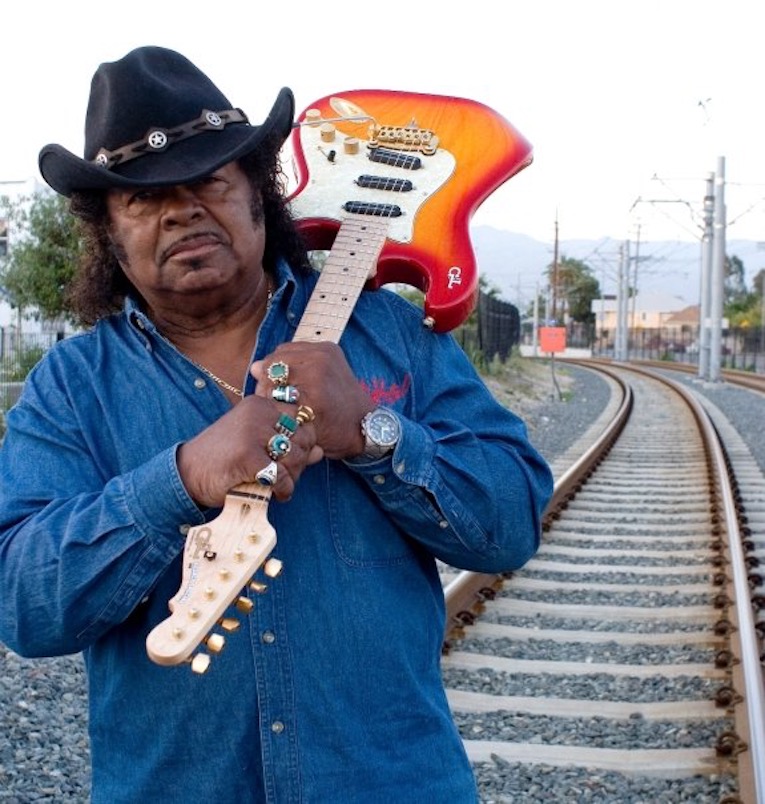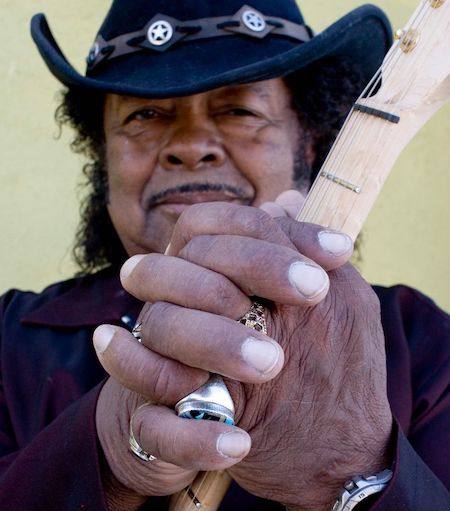
Photo: Guitar Shorty, courtesy of Alligator Records
Bluesman David ‘Guitar Shorty’ Kearney September 8, 1934-April 20, 2022
Internationally Touring Artist Recorded Eleven Solo Albums
Over Seven Decade Career
Toured With Ray Charles, Guitar Slim and Sam Cooke
From Alligator Records
Award-winning master bluesman David Kearney — known and beloved by fans worldwide as Guitar Shorty — died on Wednesday, April 20, 2022 in Los Angeles, California, of natural causes. He was 87. Credited with influencing both Jimi Hendrix and Buddy Guy, Shorty electrified audiences worldwide with his unpredictable, slashing guitar playing, gruff vocals and supercharged live shows, where he would often do back flips and somersaults while playing. The Chicago Reader said, “Guitar Shorty is a battle-scarred hard-ass. He is among the highest-energy blues entertainers on the scene.” Billboard said he played “blistering, modern blues-rock, bristling with galvanizing guitar and forceful vocals.”
While still in his early 20s, Shorty toured with blues and R&B luminaries including Ray Charles, Sam Cooke, B.B. King, Guitar Slim and T-Bone Walker. Over the first 30 years of his career, he recorded only a handful of singles for a variety of labels and an LP for a small British label. He released ten full-length solo recordings since then, many of which received massive critical and popular acclaim. His renowned live performances kept him constantly in demand all over the world. MOJO magazine noted his “hard-hitting, unrelenting intensity” and “incendiary guitar playing.” Paste said, “He’s a guitar god, and he simply unleashes one great solo after another.”
Guitar Shorty was born David William Kearney on September 8, 1934 in Houston, Texas and raised in Kissimmee, Florida by his grandmother. He began playing guitar as a young boy, excited by the sounds of B.B. King, Guitar Slim, T-Bone Walker and John Lee Hooker. After a move to Tampa when he was 17, the young Kearney won a slot as a featured guitarist and vocalist in the locally popular 18-piece orchestra led by Walter Johnson. Being younger—and shorter—than the rest of the band, a club owner bestowed the name Guitar Shorty on him, and it stuck. After a particularly strong performance in Florida, the great Willie Dixon, who was in the audience, approached Shorty. A few weeks later Shorty was in Chicago and, backed by Otis Rush on second guitar, he cut his first single for Chicago’s famed Cobra Records in 1957.

Photo: Guitar Shorty courtesy of Alligator Records
Shorty’s fortunes continued to rise when the legendary Ray Charles hired him as a featured member of his road band. While touring Florida with Ray, Shorty connected with guitarist/vocalist Guitar Slim, famous for his hit Things That I Used To Do as well as for his wild stage antics. Shorty was offered the opening slot on Slim’s upcoming tour, and Shorty jumped at the chance. Inspired by Slim, Shorty began incorporating some of the older artist’s athletic showmanship into his own performances. Before long, Guitar Shorty was doing somersaults and flips on stage. He next joined Sam Cooke’s touring band and eventually settled in Los Angeles. He gigged locally and recorded three 45s for the Los Angeles-based Pull Records label in 1959.
Shorty moved to Seattle in 1960 and eventually met Jimi Hendrix through mutual friends. Hendrix loved Shorty’s playing, and confessed that in 1961 and 1962 he would go AWOL from his Army base in order to catch Shorty’s area performances, and to pick up licks and ideas. According to Shorty, “Jimi told me the reason he started setting his guitar on fire was because he couldn’t do the back flips like I did.”
Moving to Los Angeles in 1971, Shorty opened for all the great blues stars who passed through town, including Little Milton, B.B. King, Lowell Fulson, Johnny Copeland and T-Bone Walker. In 1978 he even performed on (and won) The Gong Show, playing guitar while standing on his head. He appeared, playing himself, in the 1990 Tommy Chong film Far Out Man. A major story in Living Blues magazine brought him even more attention and led to his first British tour in 1991. While there, he cut his first full-length album.
Guitar Shorty made three albums for New Orleans-based Black Top label during the 1990s, followed by one for for Evidence Records. The success of the albums led Shorty on multiple barnstorming tours across the U.S. and around the world, including the UK, Europe and Japan. Appearances at major festivals like The Monterey Bay Blues Festival, The San Francisco Blues Festival, The Chicago Blues Festival and The King Biscuit Blues Festival brought him to larger and larger audiences.
In 2004, Guitar Shorty joined Alligator Records, releasing three of his best-selling records: 2004’s Watch Your Back, 2006’s We The People and 2010’s Bare Knuckle. Fans, radio programmers and critics shouted their support. Living Blues called Shorty “a blues rock original [who plays] screaming, empowered guitar and sings with streetwise defiance.” Texas Music Magazine said, “Axebuster extraordinaire Guitar Shorty is an old-school guitar showman. He plays with technique and flash, without ever sacrificing the passion. He’s a blues-rock hero.”
Shorty continued to tour and perform well into his 80s. His most recent album was 2019’s Trying To Find My Way Back, produced by legendary musician Jerry “Swamp Dogg” Williams.
Guitar Shorty is survived by his sister Gertrude Kearney Williams, his four children: Sean Kearney, Edmond Kearney, Tamara Kearney and Rodney Kearney, and nieces Sheena Kearney and Estalita Williams.
Funeral arrangements are pending.

Awww… I am so very saddened to hear of David’s passing. Not only was he a great blues guitarist, his songwriting style was one that cut to the chase, eliminated the bull, and went straight to the heart of the matter – he told it like it is, and I loved that about him! He was also a really nice man! I had the pleasure of meeting him at a local blues fest and while we talked for a short time, I just got such a sense of assurance and peace from him in that he truly loved and lived for doing what he was doing right then and there: making people like me happy to come out and see and hear him play. It was a hot summer day, and the heavens opened up with a cloudburst that was both refreshing and somewhat alarming to us all. Fortunately, it was rain only and no lightning, which allowed Shorty to continue right on with his playing, while walking all through the crowd with his wireless axe in hand. Everyone’s drenched, yet amazed with David’s singing and sporting a huge grin on his face the whole time! Not too many men do something like that in their late seventies! It was an experience I was glad to have witnessed, and one which I will fondly remember forever. Just like I will one David Kearney. God bless you David, and many, many thanks for ALL you gave to us from your heart. Love you bud! Guitar Shorty rocks forever!
Has the pleasure of meeting Guitar Shorty after a perfomance at Laughlin Blues feat. We talked for almost half an hour about how God had Blessed his life and other subjects. Fantastic performer and a wonderful blues artist.
Shorty was my friend for 26yrs.. We met in Taylor MI, when he came into my friends music store for some strings. We hit it off from day 1.. I will truly miss him & his wisdom. I loved his playing, but he was an even better friend with great advice! Says Shorty.. “ Time is Hard “ I never forgot that.. Times are hard indeed in the World right now.. Hopefully they will get better! Keep an eye on us all down here Shorty! Rest Easy My Friend! Much love to your family! Your friend always, VDG “Nick”
One of my fondest memories of the 1969 Aldergrove Beach Rock Festival (British Columbia, Canada) was seeing the amazing Guitar Shorty doing backflips across the stage while ripping up blues guitar riffs. Super athlete and showman extraordinaire, may he rest in peace.
The world has lost a true musical icon today with the passing of Guitar Shorty. From his early days in the clubs of Chicago and Florida to his stints backing greats such as Ray Charles and Sam Cooke to his explosive and dynamic live shows, Shorty left no doubt that he was one of the greatest guitarists of our time. He will be missed but never forgotten. Rest in peace, Guitar Shorty.
I wish that while he was here on Earth that I could have met my namesake, David “Guitar Shorty” Kearney.
Dave Kearney. :-)
Davekearney824@gmail.com